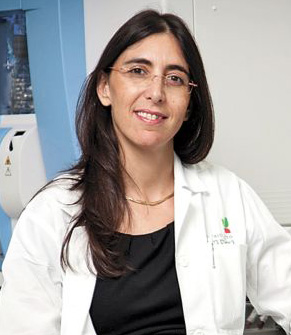Israeli Researchers Identify Protein that Protects Brain Cells from Parkinson's

Dr. Nirit Lev in her laboratory at Beilinson Hospital
Israeli researchers have identified a natural protein that protects brain cells from Parkinson's disease, a breakthrough that advances the chance of developing new ways to treat or prevent the incurable degenerative disease.
The motor symptoms of Parkinson's disease are caused by the death of brain cells that produce the neurotransmitter dopamine. Most of the current treatments involve inserting dopamine into the brain, or trying to mimic its activity.
The protein, discovered by researchers at Beilinson Hospital and Tel Aviv University, prevents the degeneration and death of these brain cells in the first place.
Recently the Technion developed a drug that blocks the enzyme responsible for breakdown of dopamine. But to date, no one has developed a specific treatment to confront the death of the brain cells that manufacture dopamine, and thus work against the primary cause of the disease.
The research team included Dr. Nirit Lev, a senior neurologist at Beilinson, and the head of the neurology department, Prof. Israel Steiner, together with Prof. Daniel Offen and Prof. Eldad Melamed of the Tel Aviv University Medical School.
The research is an outgrowth of Lev's doctoral thesis, which identified genes that increase the chances of developing Parkinson's. She focused on a gene called DJ-1, which bolsters the cell's own defense mechanisms. Various studies have shown that mutations of this gene correlate with an increased risk of Parkinson's, multiple sclerosis and neurological complications associated with diabetes.
As a result, the researchers concluded that to protect nerve cells, a drug would have to be developed that mimicked the DJ-1 gene. During the research, a peptide (short protein ) was identified that attaches itself to another peptide, so that it can penetrate the brain-blood barrier and enter the system of nerves that produce dopamine; that protein then protects those nerve cells.
The protein, which the researchers called NID-13, has been checked over the past three years in lab mice engineered to exhibit symptoms of Parkinson's. The findings show that it is effective.
The researchers have registered a patent for the protein and are now working to get the findings published in the medical literature.
"Our ability to 'correct' the level of DJ-1 was important, because Parkinson's usually presents itself after such a massive destruction of nerve cells that there are not enough cells remaining to compensate for those that died," explained Lev. "We have a relatively long time to intervene and administer a drug treatment that will prevent cell death.
"When we succeed in protecting the nerve cells and preventing their gradual death, the patients will have their quality of life restored," she said.
The mice in the Tel Aviv study received the protein by subcutaneous injection; it is likely to be administered in humans by injection as well, at least at first, to avoid having the digestive system break it down. However, medical science has already developed ways to administer proteins in pills, nasal sprays or patches.
Parkinson's is diagnosed in about 1 percent of the population over 65, and is the second most common degenerative brain disease after Alzheimer's. A study released in 2011 by Tel Aviv and Haifa universities and Maccabi Health Services indicated that some 25,000 Israelis suffer from Parkinson's. That study also showed that the frequency of Parkinson's had gone up 50 percent in a decade (1998-2007 ), occurring 256 times in every 100,000 people.
Throughout the world there are other studies being done to crack the Parkinson's riddle and develop a treatment based on the genetic makeup of the disease. In October 2010 an international team of researchers managed by Harvard that included Technion researchers reported identifying a group of genes connected to the development of Parkinson's, as well as a protein called PGC-1 alpha that could be used as a treatment for the disease.
In 2006, a drug called Azilect, developed by Teva Pharmaceutical
s and researchers at the Technion, was approved for use as a treatment for symptoms of Parkinson's. Teva had tried to get approval from the U.S. Food and Drug Administration to also market Azilect as a drug that slows down the underlying disease. But an FDA panel ruled this past October that Azilect had not been proven to have any disease-modification effect.
Original article by Dan Even for the Haaretz Newspaper, Thursday July 5th, 2012
Related Articles
iPad Catheterization Application Used for the First Time at Rabin Medical Center
A new advanced technology has been developed for the first time worldwide, at Rabin Medical Center's Invasive Cardiology Institute, where all pertinent information collected during the cardiac catheterization procedure is sent directly to an iPad.
Less Anxierty Improves In Vitro Fertilization
For many women who have difficulty getting pregnant, the in vitro fertilization (IVF) process can be extremely stressful and all consuming.
New Hope for the Blind
Rabin Medical Center has performed the first artificial cornea transplant in Israel, bringing new hope to patients who are blind.